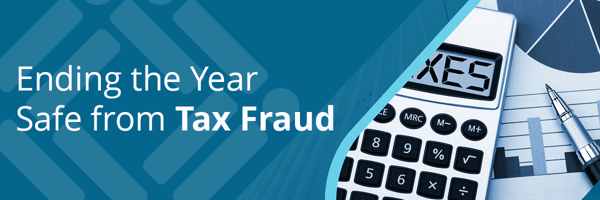The Criminal Investigation (CI) unit is a special criminal division of the IRS. The CI is tasked...
Are You a Target This Tax Season?
%20(3)-1.jpg)
The Criminal Investigation (CI) unit is a special criminal division of the IRS. The CI is tasked with investigating and uncovering tax-related crimes and prosecuting these cases. Each year the CI provides the IRS with an annual report detailing the work of the CI and highlighting their successes and enforcements related to tax and financial crimes.
Why is this important to you? The work of the CI is critical in protecting taxpayers as well as maintaining the integrity of our financial system. Even more importantly, the information uncovered by the CI paints a very clear picture of what criminal activities are on the rise, and their annual report provides valuable information on what to watch out for and how you can protect yourself and your personal information in the future. You can review what CI identifies as the top "dirty dozen" schemes from 2022 and their full annual report.
In 2022, $5.7 billion was identified as tax fraud. This includes general tax fraud, abusive tax schemes, unemployment tax, identity theft, and refund fraud. While anyone can become a victim of tax fraud, it's generally at-risk populations that are the most affected, such as older adults or non-English-speaking taxpayers. While these populations are most at risk, the criminals behind these bogus schemes view everyone as potentially easy prey.
The IRS urges everyone to be on guard all the time and to look out for others in their lives. While paying special attention is important during tax season, taxpayers are encouraged to review the list in a special section on IRS.gov and be on the lookout for these scams throughout the year. This year, tax crimes have become more complex and sinister than ever before, including scams like identity theft, phishing, fake charities, false claims, and more. This article will cover new fraud schemes and reoccurring ones in hopes of helping you understand what to watch for and how to protect yourself and your loved ones.
New Scams for 2023
Wage and Tax Statement
The IRS recently issued an alert to a new scheme making its way through social channels. This scheme prompts individuals to use tax software to manually complete Form W-2, also known as the Wage and Tax Statement, and to include fabricated income details. The scammers behind this scheme advise people to falsify significant income and withholding figures and identify the employer from which it supposedly originated.
They then instruct taxpayers to electronically submit the fraudulent tax return in the hopes of receiving a substantial refund, which can sometimes amount to as much as five figures, due to the falsified withholding.
"We are seeing signs this scam is increasing, and we worry that innocent taxpayers could be at risk of being tempted into falling into a trap that puts them at risk of financial and criminal penalties," said Acting IRS Commissioner Doug O'Donnell. "The IRS and Security Summit partners remind people there is no secret way to get free money or a big refund. People should not make up income and try to submit a fraudulent tax return in hopes of getting a huge refund."
Social Security Scam
This is just a new twist on an existing impersonator scam where scammers claim to be able to cancel or suspend a victim's Social Security Number (SSN) in an attempt to gain sensitive information. In this scam, a taxpayer receives a threatening call accusing them of having unpaid or overdue taxes.
The result of this call is that the taxpayer divulges personal information before realizing that it is fraud. If you receive a threatening call, hang up and do not call the number back. Instead, report the call to the Treasury Inspector General for Tax Information using the red button at the top of their website.
Returning Scams
Phishing
According to the IRS, more than 90% of identity thieves start with phishing emails. These emails appear to be from a trusted company, often masquerading as your tax preparer or the IRS during tax season. These emails typically have some urgency to their request, such as "there is a problem with your account," and ask for personal information such as passwords or account information.
The IRS will never initiate contact with taxpayers via email about a tax bill, refund, or Economic Impact Payment. Don't click on website links in emails claiming to be from the IRS; they may be nothing more than scams to steal personal information. Phishing schemes also occur through a variety of channels, including letters, texts, and website links.
Fake Charities
Criminals frequently take advantage of current events, such as natural disasters, by setting up fake charities to steal from well-intentioned people. Fraudulent schemes typically start with unsolicited contact by telephone, text, social media, email, or in-person using a variety of tactics. Bogus websites use names similar to legitimate charities to trick people into sending money or providing personal financial information.
They may even claim to be working for or on behalf of the IRS to help victims file casualty loss claims and get tax refunds. Legitimate charities will provide their Employer Identification Number (EIN) if requested, which can be used to verify their legitimacy. In addition, you can find legitimate and qualified charities with thIs Tax Exempt Organizations Search Tool on IRS.gov.
Threatening Impersonator Phone Calls
IRS impersonation scams come in many forms. A common one remains bogus threatening phone calls from a criminal claiming to be with the IRS. The scammer attempts to instill fear and urgency in the potential victim.
In fact, the IRS will never threaten a taxpayer or surprise them with a demand for immediate payment. Scam phone calls, including those that threaten arrest, deportation, or license revocation if the victim doesn't pay a bogus tax bill, are reported year-round.
These calls often take the form of a "robocall" (a text-to-speech recorded message with instructions for returning the call). Again, the IRS will never demand immediate payment, threaten, ask for financial information over the phone, or call about an unexpected refund or Economic Impact Payment.
EIP or Refund Theft
The IRS has made great strides against refund fraud and theft in recent years, but they remain an ongoing threat. Tax-related identity theft occurs when someone uses your stolen SSN to file a tax return claiming a fraudulent refund, and directing it to their P.O. Box or a fake bank account.
You may be unaware that this has happened until you e-file your return and discover that a return has already been filed using your SSN. Or the IRS may send you a letter saying it has identified a suspicious return using your SSN.
Senior Fraud
Seniors are more likely to be targeted and victimized by scammers than other segments of society. As time goes by more people who enter the senior population are using social media, online accounts, and use of the internet, which unfortunately gives scammers another means of taking advantage. Phishing scams targeting seniors continue to be a threat each tax filing season. Seniors need to be alert for a continuing surge of fake emails, text messages, websites, and social media attempts to steal personal information.
Scams Targeting non-English Speakers
IRS impersonators and other scammers also target groups with limited English proficiency. Some scams also target those potentially receiving an Economic Impact Payment from previous years and request personal or financial information from the taxpayer. Phone scams pose a major threat to people with limited access to information, including individuals not entirely comfortable with the English language. These calls frequently take the form of an automated "robocall" but sometimes may be made by a real person. A common one is the IRS impersonation scam, where a taxpayer receives a telephone call threatening jail time, deportation, or revocation of a driver's license from someone claiming to be with the IRS. Taxpayers who are recent immigrants are often the most vulnerable and should ignore these threats and not engage with scammers.
Unscrupulous Return Preparers
Most tax professionals provide honest, high-quality service; however, dishonest preparers pop up every tax filing season. Using an unscrupulous preparer can lead to fraud using the taxpayer's personal information or worse, the taxpayer might be talked into committing fraud themselves. Taxpayers should avoid so-called "ghost" preparers who expose their clients to potentially serious filing mistakes as well as possible tax fraud and the risk of losing their refunds.
Ghost preparers don't sign the tax returns they prepare. Instead, they may print the tax return and tell the taxpayer to sign and mail it to the IRS. For e-filed returns, the ghost preparer will prepare but not digitally sign as the paid preparer. By law, anyone who is paid to prepare or assists in preparing federal tax returns must have a Preparer Tax Identification Number (PTIN). Paid preparers must sign and include their PTIN on returns. Taxpayers are ultimately responsible for the accuracy of their tax returns, regardless of who prepares them. You can go to a special page on IRS.gov for tips on choosing a preparer.
Offer in Compromise Mills
Taxpayers need to be wary of misleading tax debt resolution companies that can exaggerate the chance of settling tax debts for "pennies on the dollar" through an Offer in Compromise (OIC). These offers are available for taxpayers who meet very specific legal criteria to qualify for reducing their tax bill. But unscrupulous companies oversell the program to unqualified candidates so they can collect a hefty fee from taxpayers already struggling with debt.
Individual taxpayers can use the free online Offer in Compromise Pre-Qualifier tool to see if they qualify. The simple tool allows taxpayers to confirm eligibility and provides an estimated offer amount. Taxpayers can apply for an OIC without third-party representation, but the IRS reminds taxpayers that if they need help, they should be cautious about whom they hire.
Fake Payments with Repayment Demands
Criminals are constantly finding new ways to trick taxpayers into believing their scam, including putting a bogus refund into the taxpayer's actual bank account. Here's how the scam works:
A thief steals or obtains a taxpayer's personal data, including SSN or Individual Taxpayer Identification Number (ITIN) and bank account information. The scammer files a bogus tax return and deposits the refund into the taxpayer's checking or savings account. The fraudster then calls the taxpayer, posing as an IRS employee claiming that the payment was in error and needs to be returned. The taxpayer, knowing that the refund is not consistent with what they have filed with the IRS, or that they have not yet filed for a refund, believes that this is an honest mistake.
The fake IRS caller tells the taxpayer that the money returned immediately. The taxpayer is told to either use a payment service, such as Zelle, or the taxpayer is told to buy specific gift cards for the amount of the refund and send them by mail. Either way, these methods are the same as cash and it is not recoverable. Anytime you receive an unexpected refund or a call from anyone out of the blue demanding a refund repayment, you should reach out to Mutual Security Credit Union (MSCU) and the IRS.
We are here for you!
Following the IRS's advice in each instance is important, but know that we are here for you! While it's important to stay aware of the above tax-related risks and practice good habits to protect your identity, we want you to remember that MSCU has you covered in the event of tax fraud related or any type of identity theft. If you are an account holder with Enhanced and Elevated Checking. you have Fully Managed Identity Theft Recovery. Should you feel your identity has been compromised, we have professional Identity Theft Recovery Advocates standing by. These Advocates work on your behalf to help recover and to help you reverse any damage caused by identity theft. Contact us or find out more about the benefits of your Enhanced and Elevated Checking accounts by visiting https://www.mscu.net/checking.



